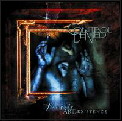|
After hearing Death for the first time I had to get the Control
Denied's "The Fragile Art Of Existence." This disc is
the more progressive style of music that Chuck Schuldiner has
been working on (and off) for the last few years. Death, and death
metal, purists may take exception to Chuck's new direction with
Control Denied, but there is simply too much quality music here
to dismiss the band on other people's impressions.
"The Fragile Art Of
Existence" is not a repeat of the previous Death disc ("The
Sound Of Perseverance") - this disc is a major step forward.
Schuldiner skillfully arranges the songs for maximum impact, adds
progressive elements, introduces cleaner vocals, and incorporates
engineering and production features to provide depth and substance.
The result is high quality metal in which nothing is compromised.
Control Denied's pacing is
slower than Death's most recent effort; however, this is a impressive
move as the slower pace allows Schuldiner and the gang to include
a variety of rhythmic tempos and emotional moods. Even traditional
sounding metal riffs are twisted into interesting forms; "Breaking
The Broken" and "When The Link Becomes Missing"
are examples. The extended guitar solos are a welcome addition;
"What If..." and "Believe" are clear testimonies
to the power of heavy metal solos. To top it all off, the rhythm
section varies from double-time insanity to slow intricacies.
Tim Aymar's cleaner vocal
style is a welcome change. At times he echoes other singers (Ray
Alder on "Consumed" and a Dickinson/Halford hybrid on
"Expect The Unexpected"), but overall he comes across
with a perfect sound for the band. Chuck Schuldiner and Shannon
Hamm blaze away on extended guitar solos. The rhythm section of
Steve DiGiorgio (ex-Death now of Testament) and Richard Christy
are tight and innovative. The lyrics are simply some of the best
thought provoking words put to songs in the last few years - this
is very challenging material.
Simply put "The Fragile
Art Of Existence" is now one of my favorite records of 1999.
For me, it combines the best of the progressive excellence of
Fates Warning's (i.e. "Perfect Symmetry") with Death's
extreme style.
|
